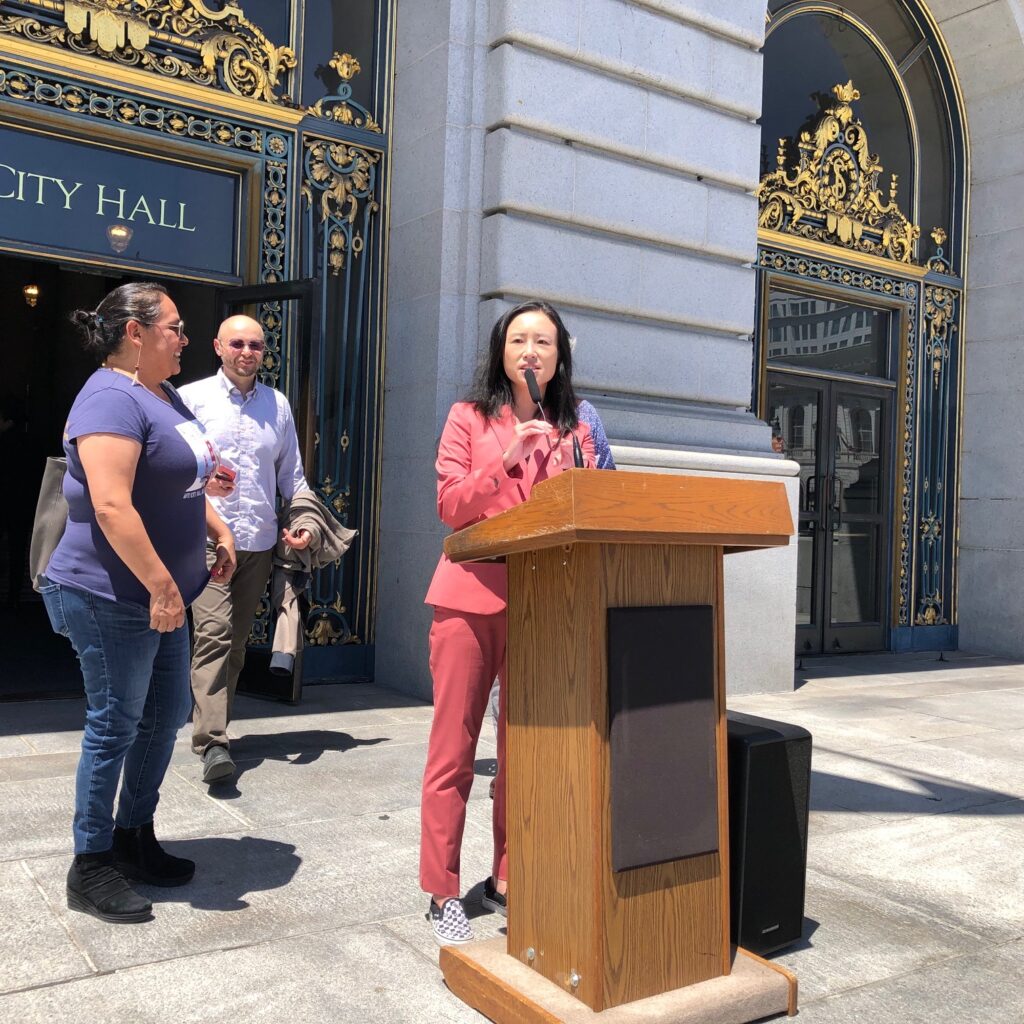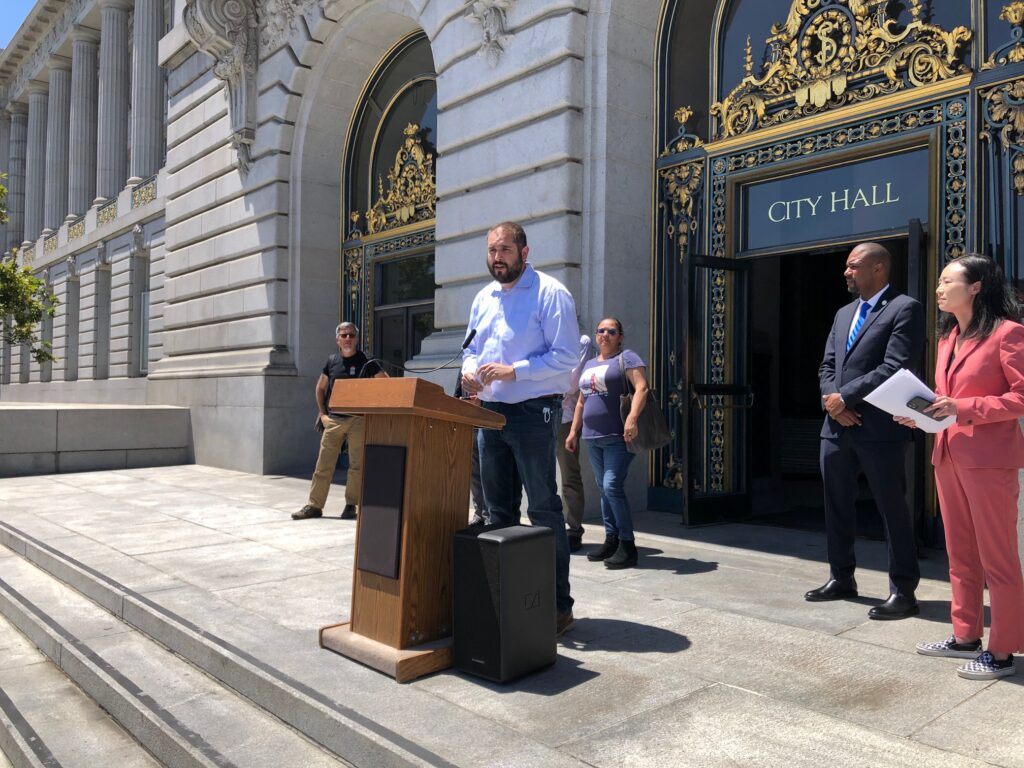Three San Francisco supervisors introduced today amendments to the City Charter that would substantially reform housing affordability in the city.
Measures by Sup. Connie Chan and Aaron Peskin would streamline approval for affordable-housing projects and require that developers of any new rental projects seeking increased density agree to accept the city’s rent-control laws.

A measure by Sup. Dean Preston would create a commission to oversee the development and administration of affordable housing.
The Peskin and Chan proposals set up interesting political battles: The Yimbys, with the support of Mayor London Breed, have their own affordable-housing measure and are gathering signatures for the November ballot.
Imposing rent controls on new market-rate projects could become a flash point, too, if the Yimby folks and the mayor say it might discourage housing production.
Preston’s plan will almost certainly face opposition from the mayor.
Chan presented her plan at a City Hall press conference today, noting that she arrived in San Francisco as an immigrant at 13, and it was affordable rent-controlled housing that allowed her family to survive in the city.
She and others who spoke noted that the city has already approved and has seen constructed far more market-rate luxury housing than state standards require. But San Francisco is falling radically short on the construction of housing that the people who work her can afford—and that includes the construction workers who are building the new housing.
Developers have long complained about the approval process in San Francisco, saying that environmental reviews, conditional-use requirements, and neighborhood appeals take so long that they drive up costs.
I have yet to see a single developer present a plan showing how eliminating all of those barriers would allow the private market to develop housing that is anything but way out of reach to most San Francisco workers—and I have asked repeatedly.
But never mind: There are costs to delays, and if eliminating those costs can make it easier to build affordable housing, everyone seems to agree that’s a good idea.
But the Yimby/Breed measure defines “affordable housing” as units that people earning 140 percent of the Area Median Income can afford. That standard, for a family of four, is $193,950. That, under the standards of the proposal, would mean that units renting for $4,850 a month would be considered “affordable” and would get approved without any review.
In many parts of town, that’s already pretty close to market rate. So the developers wouldn’t have to give up anything to go to the front of the line.
That measure also would allow private developers to get streamlined approval if their luxury projects included 25 percent affordable units. That’s not enough to break even in this crisis.
Chan’s plan would define “affordable” as up to 120 percent of AMI, and would mandate closer to 40 percent affordability for luxury projects.

The Chan approach also mandates strong labor standards for any project that seeks expedited review. Rudy Gonzalez, the head of the Building Trades Unions, was at the press conference today, and the trades support the Chan approach.
Sup. Shamann Walton noted that developers will complain about the higher affordability levels, but “it’s a myth that you can’t make housing affordable. It’s a myth that you can’t pay workers a prevailing wage.”
Chan needs six votes to put her charter amendment to the voters. She already has three, with Peskin and Walton as co-sponsors, and she told me she is confident she will get the votes.
Breed and the Yimbys can raise money for signatures. So maybe there are two competing affordable-housing measures on the fall ballot. The one that gets the most votes will prevail.
If it comes down to a political battle, the progressives and the building trades will be up against the mayor and the developers and the Yimbys. The alliance between affordable housing advocates and the trades is huge, and historic, and has been in the works for a while. It might defeat the big developer money.

Peskin’s proposal would consolidate a series of different measures that seek to make sure developers who want a favor from the city—that is, a special exemption from then existing rules on height and density—agree to accept rent control.
The city can’t, under state law, impost rent controls on apartments build after 1979. That law, the Costa-Hawkins Act, also bans rent controls on vacant apartments. It’s been a target of tenant activists for decades, but the real-estate industry’s grip on the state Legislature has made reform almost impossible.
The Peskin approach is a work-around, something the city has done in the past with specific projects. The massive Park Merced rebuild included a requirement that the new units be under rent control. Sup. Rafael Mandelman’s upzoning legislation requires that developers who take advantage of the new rules also accept rent control.
It’s part of what tenant advocates call “value recapture:” When the city gives a developer a financial benefit, like upzoning, that makes the land more valuable, and the city ought to be able to get some of that benefit, too.
The trades are also supporting the Peskin measure. “They know that this will have no impact on what gets built, because the financing of new units is based on today’s rent, not on future rent,” he told me.
That’s reality. The Yimbys are not big on accepting economic reality. We shall see where the support and opposition for this measure appears.
Preston’s measure would add a level of accountability to the city’s affordable-housing process by creating a Housing and Community Development Department, overseen by a seven-member commission. Three of the members would be appointed by the mayor, three by the supes, and one by the city treasurer.
If it passes, the mayor would no longer have absolute control over affordable housing development. The commission might, for example, decide that spending the Prop. I money the way the voters approved is the right way to go.
Not sure how the real-estate industry and the mayor’s allies will try to oppose this.



